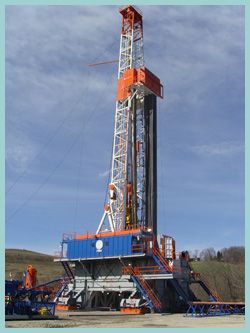Fracking watch: Algeria figures out what CA hasn’t
by CalWatchdog Staff | May 7, 2013 6:15 am
 May 7, 2013
May 7, 2013
By Chris Reed
Hydraulic fracturing — the use of underground water cannons to blast open access to energy reserves — has been around since the 1940s in the United States and Canada and for nearly as long in Russia. In no country anywhere in the world did enviros depict fracking as hell on Earth until the past few years, when hyrdraulic fracturing got much more efficient and suddenly began a threat to greens’ all-out push for costly renewable energy.
Last week, alas, the geniuses in the Legislature took initial steps[1] to block fracking in California when AB 1301 and two other anti-fracking bills passed the Assembly Natural Resources Committee. Green-sycophant lawmakers simply don’t care that the Obama administration sees fracking as just another heavy industry[2] that is dirty but can be made OK with strong regulation.
This pandering and the media’s pathetic acceptance of the NRDC narratives about fracking are why I have blogging each morning since April 27 about the nations around the world that embrace fracking and thus common sense. Duh — cheap energy is good. Duh — having as low energy costs as your economic rivals is good. Duh duh duh.
So far I’ve covered Germany[3], China[4], Russia, [5]Saudi Arabia[6], Brazil[7], Canada[8], Argentina[9], Mexico[10], South Africa[11].and Poland[12]. Now it’s Algeria’s turn. What’s my point? As I have written here before, it’s that the fracking/brown energy revolution is coming, regardless of what greens in the Golden State and Europe want, and that California can either join in the party or get left behind.

Fracking sanity chapter No. 11: Algeria
The fracking debate in Algeria reflects the debate in so many countries. The greens complain[13], the experts weigh in, and then fracking is embraced. Driving the debate to an odd degree: U.S. government estimates of shale reserves, which are considered honest and unbiased by local politics. This is from a January report in The Economist (trn stands for trillion):
“North Africa is known for its conventional gas production, but attention is now beginning to turn to unconventional resources, especially shale gas. The US Energy Information Administration (EIA) estimates that Algeria, Libya, Tunisia, Morocco, Mauritania and Western Sahara hold 557trn cu ft of technically recoverable shale-gas resources. Libya and Algeria top the pile, with 290trn cu ft and 231trn cu ft each, although Algeria’s energy minister, Youcef Yousfi, has put his country’s reserves as high as 1,000trn cu ft. This seems optimistic, but is an accurate indicator of the level of enthusiasm for shale gas in Algeria.
“Among aspiring North African exploiters of shale gas, Algeria has come furthest …. negotiations with ExxonMobil are in progress, while agreements have been struck with Royal Dutch Shell, Italy’s Eni and Canada’s Talisman. Eni has drilled a first test well in south-west Algeria, although the results are not yet public. Meanwhile, in Libya Talisman has held talks and the Polish Oil and Gas Company (PGNiG) says it is keen to explore for unconventional resources in the Sirte Basin. In Tunisia, which has an estimated 18trn cu ft of shale gas, Shell is discussing a potential exploration and production contract. Any gas produced would be sold in the domestic market, though no memorandum of understanding has yet been signed.”
‘No alternative’ but to develop shale gas
This is from a November report in Agence France-Presse:
“Algeria, the world’s fourth-largest gas exporter, has decided to develop its shale gas potential as well … . Officials say the country’s shale gas reserves are 17 trillion cubic metres, or around four times greater than its current known gas reserves.
“Algeria may be the world’s eighth-largest natural gas producer in 2011, according to the BP Statistical Review of Energy, but domestic consumption is surging. Official forecasts say that, from 2019, local demand will eat up all the country’s production.
“At present, 50 years after it gained independence, the country remains almost totally dependent on hydrocarbons, which account for 90% of its exports.
“So as long as it fails to diversify its export base, it has no alternative than to develop shale gas, an unconventional fossil fuel, to secure its energy future, experts say.
“A new hydrocarbons bill, to be introduced in parliament in the coming weeks, encourages the exploration of unconventional gas and oil resources.”
Cheap energy? Bah, humbug
This is the new world we live in. But is it the world that California lawmakers and green cultists live in? Nope. So unless Gov. Jerry Brown finally lives up to his self-hype as the smartest man in the Golden State, look for manufacturing jobs to disappear — and that’s just for starters.
There are few things more important to economic competitiveness that the cost of energy. Between AB 32 and a moratorium on fracking, state elected officials could hardly do more to damage the state’s economy.
But, hey, what do they care? They’ve got jobs.
Fracking watch: Previous posts
No. 1: Germany[3]
No. 2: China[4]
No. 3: Russia[14]
No. 4: Saudi Arabia[6]
No. 5: Brazil[7]
No. 6: Canada[8]
No. 7: Argentina[9]
No. 8: Mexico[10]
No. 9: South Africa[11]
No. 10: Poland[12]
- initial steps: http://www.vcstar.com/news/2013/apr/29/assembly-committee-passes-three-bills-to-impose/
- just another heavy industry: http://money.cnn.com/2012/05/04/news/economy/fracking_rules/index.htm
- Germany: http://www.calwatchdog.com/2013/04/27/fracking-watch-germany-figures-out-what-ca-hasnt/
- China: http://www.calwatchdog.com/2013/04/28/fracking-watch-china-figures-out-what-ca-hasnt/
- Russia, : http://www.calwatchdog.com/2013/04/29/fracking-watch-russia-figures-out-what-ca-hasnt/
- Saudi Arabia: http://www.calwatchdog.com/2013/04/30/fracking-watch-saudi-arabia-figures-out-what-ca-hasnt/
- Brazil: http://www.calwatchdog.com/2013/05/01/fracking-watch-brazil-figures-out-what-ca-hasnt/
- Canada: http://www.calwatchdog.com/2013/05/02/fracking-watch-canada-figures-out-what-ca-hasnt/
- Argentina: http://www.calwatchdog.com/2013/05/03/fracking-watch-argentina-figures-out-what-ca-hasnt/
- Mexico: http://www.calwatchdog.com/2013/05/04/fracking-watch-mexico-figures-out-what-ca-hasnt/
- South Africa: http://www.calwatchdog.com/2013/05/05/fracking-watch-south-africa-figures-out-what-ca-hasnt/
- Poland: http://www.calwatchdog.com/2013/05/06/fracking-watch-poland-figures-out-what-ca-hasnt/
- greens complain: http://www.demotix.com/news/1961623/algeria-anti-fracking-demonstration-outside-hsbc-london#media-1961545
- Russia: http://www.calwatchdog.com/2013/04/29/fracking-watch-russia-figures-out-what-ca-hasnt/
Source URL: https://calwatchdog.com/2013/05/07/fracking-watch-algeria-figures-out-what-ca-hasnt/